Chickens are terrific foragers and will consume a wide variety of foods available in their environment. Insects, berries, and greenery are among their favorite foods. However, they require various nutrients in their diet. “Can chickens eat fish?” you might question. Continue reading to find out if fish is an excellent source of nutrients for your backyard pets.
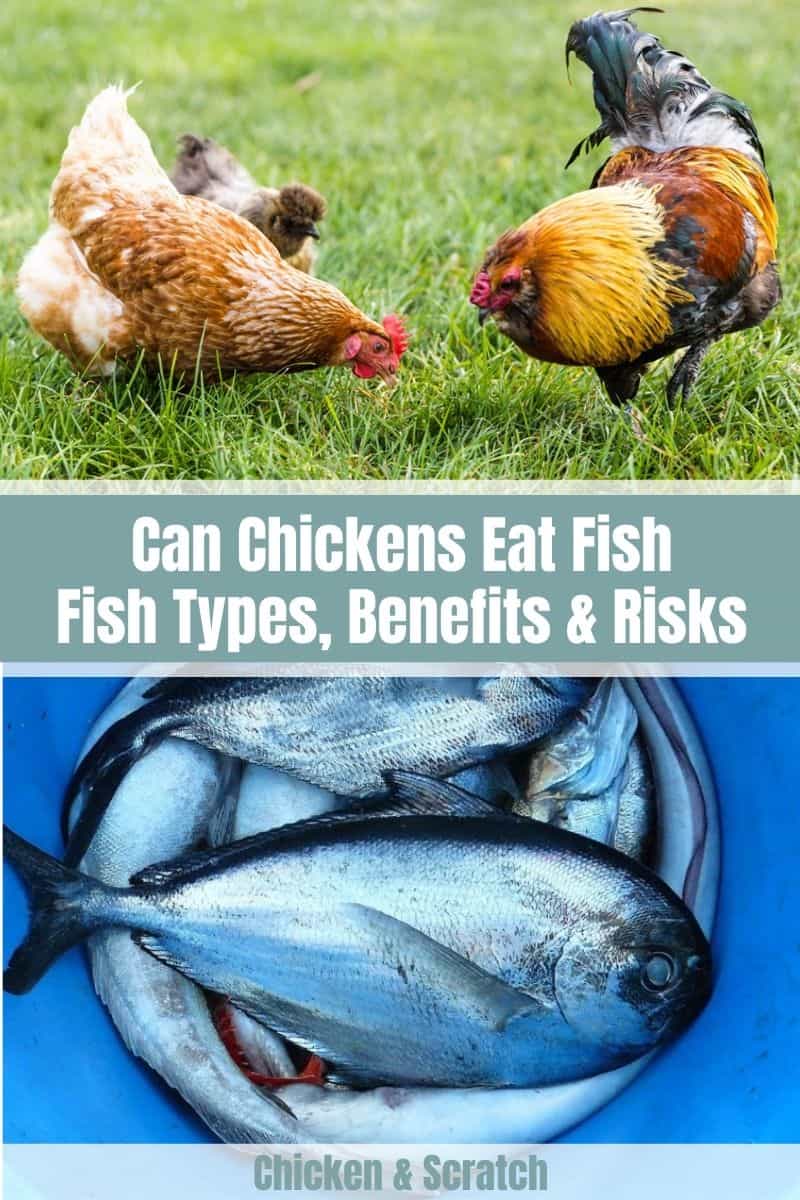
Is fish healthy for chickens?
Chickens have various nutritional needs you can address if you feed them poultry feed. Fish can be a great way to add variety to their diet.
The nutritional value of fish differs according to the species. In general, fish is high in a variety of vitamins and minerals.
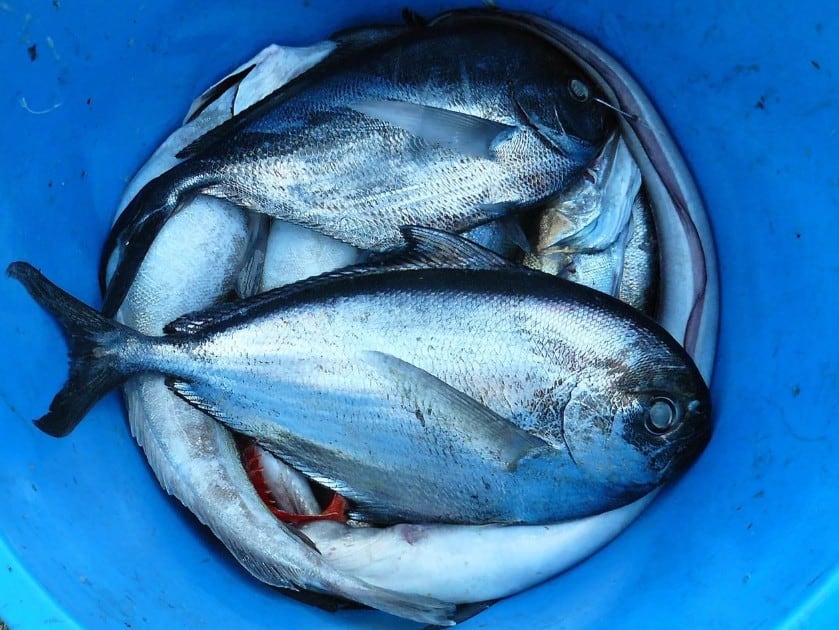
Protein
Chickens require a lot of protein like other birds. Protein is essential for a chicken’s growth and egg production. It also aids immunity, adaptation to surroundings, and other biological processes.
Poultry experts and veterinarians estimate that protein accounts for 16-20% of a chicken’s total dietary consumption. Of course, this depends on their breed, age, and other factors.
Furthermore, chickens respond to protein in their diet differently. Their absorption depends on the offered quality of protein and amino acids. Low-quality protein has a different impact on growth and egg quality than high-quality protein.
As a chicken keeper, your role is to ensure you provide high-quality poultry feed as the primary component of their diet. Feed is the primary component of their diet. Ensure that your chickens get the protein and other nutrients they require.
Then, consider adding protein-rich sources to your chicken’s diet. Nutritionists believe fish are of excellent quality. It can be a fantastic way to increase your chickens’ protein consumption.
In addition, high-protein foods cause kidney issues and obesity in chickens. However, be mindful that some fish can have a relatively high protein content, which should be balanced within their overall diet.
Therefore, moderation is essential. Feed your flock fish once a week only. You can also offer them fish when they’re stressed out. These situations include when they’re molting, recovering from a predatory attack, or protecting themselves from extreme cold.
Nutrients
Fish is one of the most nutrient-dense foods on the planet. They contain a wide range of minerals and vitamins.
Fish has high quantities of Omega-3 fatty acids, which benefit both humans and animals. Omega-3 lessens the risk of heart ailments, neurological disorders, and auto-immune diseases, such as Coccidiosis in chickens.
The chicken’s immune system centers around the intestines, and probiotics found in fish are compatible with the biome found in the gut of chickens, The addition of fish strengthens their intestines. Chickens can process food more efficiently, resulting in fewer illnesses.
Some other nutrients found in several varieties of fish are listed below:
| Fish | Nutrients |
| Halibut | Niacin, magnesium, phosphorus, vitamin B6, vitamin B12 |
| Tuna | Calcium, zinc, B vitamins, magnesium, potassium, phosphorus, choline |
| Cod | Vitamin B12, magnesium, potassium, choline, iodine |
| Tilapia | Vitamin B12, vitamin D, selenium, potassium, phosphorus, niacin |
| Pollock | Choline, iron, calcium, magnesium, selenium, phosphorus |
| Catfish | Selenium, sodium, thiamine, potassium |
| Haddock | Phosphorus, selenium, niacin, sodium |
There are numerous fish options you can give your chickens. You can buy many of these fish in the shop and almost certainly eat them yourself. So, if you want to give your chickens fish, purchase more in your store. Then give them the leftovers.
What kinds of fish should you not give to chickens?
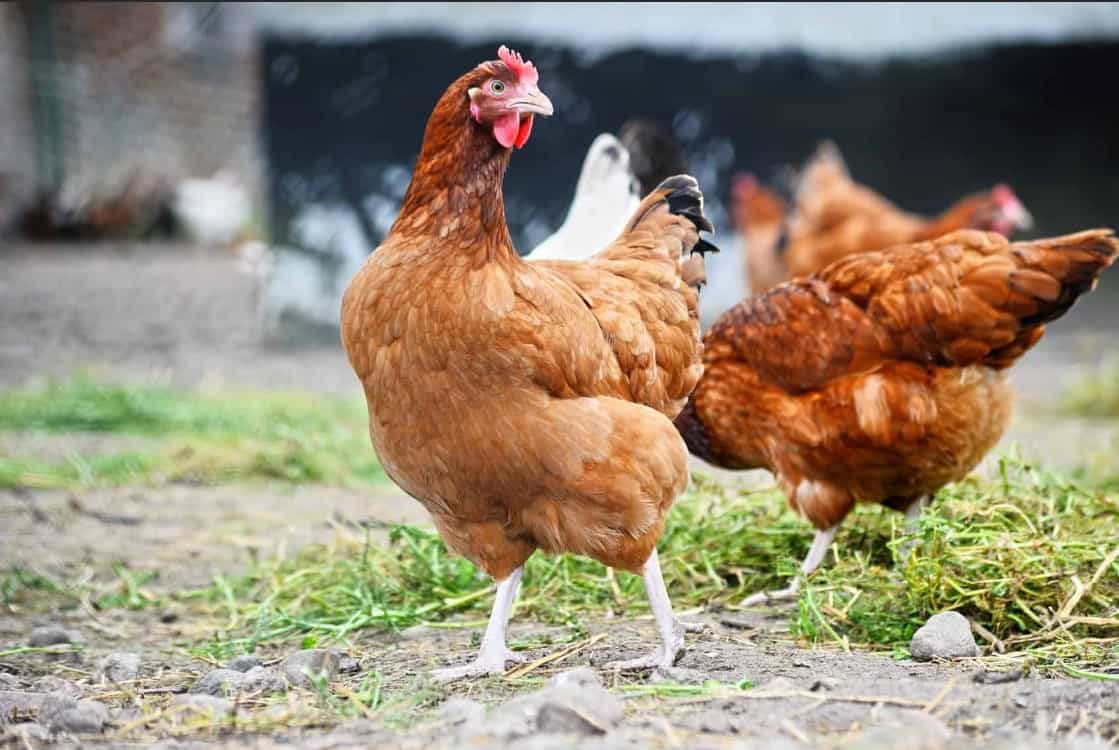
If you’re serving fish to your backyard companions, keep in mind that some fish have higher mercury content than others. Ingesting contaminated fish is one of the leading sources of mercury poisoning in America.
Mercury poisoning in chickens can be considerably more deadly than in people. Since chickens are smaller than humans, even minute levels of mercury can cause harm.
According to the Natural Resources Defense Council (NRDC), avoid the following fish species as they have high mercury levels:
- Orange roughy
- Shark
- King Mackerel
- Tilefish
- Marlin
- Swordfish
- Ray
- Barramundi
- Ling
- Gemfish
Tuna can also raise mercury levels, but only if eaten frequently and in significant quantities.
Also, avoid fish with high-fat content, such as herring and salmon. Extra fats are bad for chickens, just as they are in humans. They can cause a variety of ailments, such as Sudden Death Syndrome.
Can chickens eat raw fish?
Raw fish is safe for chickens to eat. If you’re going to feed raw fish to your chickens, chop them into small pieces. They’ll be more likely to consume all fish this way, and no leftovers will waste.
Can chickens eat cooked fish?
Cooked fish is safe for chickens to consume. You can poach, boil, bake, or grill the fish. Chickens can eat cooked fish as long as there are no added seasonings or oil.
You can either combine the fish with poultry feed or serve it independently. When fish is pricey, mixing it with chicken feed is an excellent way to save money while giving your birds a tasty fishy treat.
Alternatively, you can cut the fish into smaller strips or serve it whole. If the fish has huge, jagged bones, cut them into smaller pieces. Discard the larger bones while slicing them so the chickens won’t have any problems with them.
Can chickens eat whole fish?
Interestingly, chickens can easily consume whole fish. They can quickly eat and digest bones, meat, scales, head, and tail. You don’t have to worry about poisoning or killing the flock if you throw a whole fish at them.
The chickens will eat an entire fish, whether raw or cooked. When a chicken encounters a bone too large to eat, it will often peck the meat from the bone.
Chickens are self-aware. They won’t usually take on too big a bone to manage. The risk isn’t exceptionally high, but it’s still essential to be watchful.
Can chickens eat fishbones?
Fishbones are edible to chickens. However, they can create problems depending on how sharp and massive they are.
They can break, causing complications for your chickens before and after consumption. They can damage the chickens’ throats and internal organs. The bones may shatter and become trapped in their throats as they go down.
So, removing sharper and larger bones before feeding could be beneficial. You may also break the bones ahead of time. But you’ll need to watch your chickens because they’ll eat them.
Sardines are a kind of fish in which bones may not be an issue. They’re tiny and will crumble if eaten.
Calcium is abundant in sardine bones. So, sardines can help your backyard pets get more calcium, which is required for egg development and production.
The digestive system of chickens is quite robust. It can break down soft and tiny bones without difficulty. Cooked fish bones are also more delicate.
Can chickens eat fish guts?
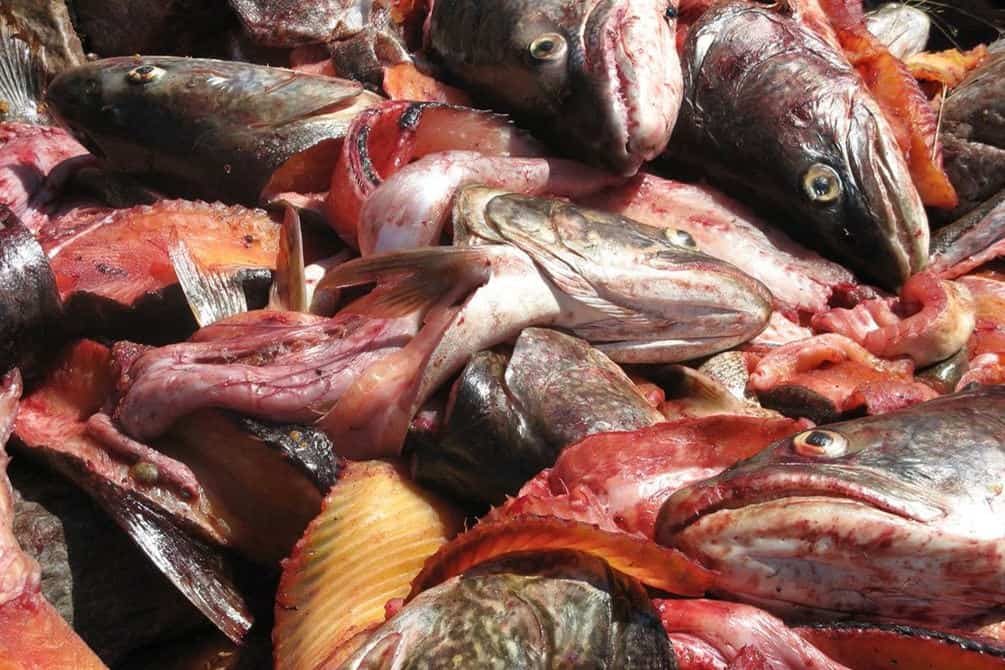
Chickens can eat fish guts, but they’re much better when cooked. Tapeworms can be found in the stomachs of some fish, and you don’t want them to infect your flock. Cooking will kill the parasites.
Include the fish guts if you’re going to feed your chickens the entire fish. Fish guts are a terrific source of nourishment for your chickens, but there are certain risks associated with giving them.
Although chickens can consume fish guts, serve them after being cooked. If you want to keep your flock from getting internal parasites, boiling the intestines first reduces the chance significantly.
Can chickens eat canned fish?
Additives like preservatives and flavors are commonly found in canned fish. While the fish itself may not be harmful to your chickens, the additives may be.
Tinned fish can be a terrific alternative rather than feeding raw fish promptly. Fresh fish is more expensive than canned fish. There are a few things to bear in mind if you’re thinking of feeding canned fish to your flock.
It would be best if you chose fish preserved in water. There will be too much fat in canned fish preserved in oil. When selecting canned fish, look at the label as well. You’ll want something low in salt and doesn’t have any added sweeteners.
Can chickens eat spoiled fish?
You should not offer fish that has gone bad to your chickens. Spoiled fish serve as a breeding ground for a variety of hazardous bacteria. Allowing your chickens to eat rotten fish could expose them to different infections, including food poisoning. They may also die.
Usually, spoiled fish stinks. The odor is practically unbearable. A decaying fish will have considerable discoloration in addition to a foul odor.
So, if you notice any signs that the fish has gone rotten, don’t feed it to the chickens. Chickens have a poor sense of smell. They may not be able to tell whether the fish is rotten. So, you must never forget to discard any spoiled fish.
Can chickens eat dry fish?
Dry fish is fantastic since it lasts a long time. It’s also easier to crumble into smaller amounts. Consider dried fish when planning how to buy or prepare fish for your backyard friends.
Dry fish is also an excellent method to provide them with the minerals and protein found in fish. You won’t have to worry about the fish deteriorating.
You can add dry fish to your chickens’ usual feed on occasion. You can also offer it as a tasty treat.
Summary
Can chickens eat fish? Chickens can eat fish and fish bones. They can also consume the scales, guts, and any other part of the fish. Fish is generally safe and healthy for your birds. It has a wide range of minerals, including vitamins and proteins, beneficial to your chickens.
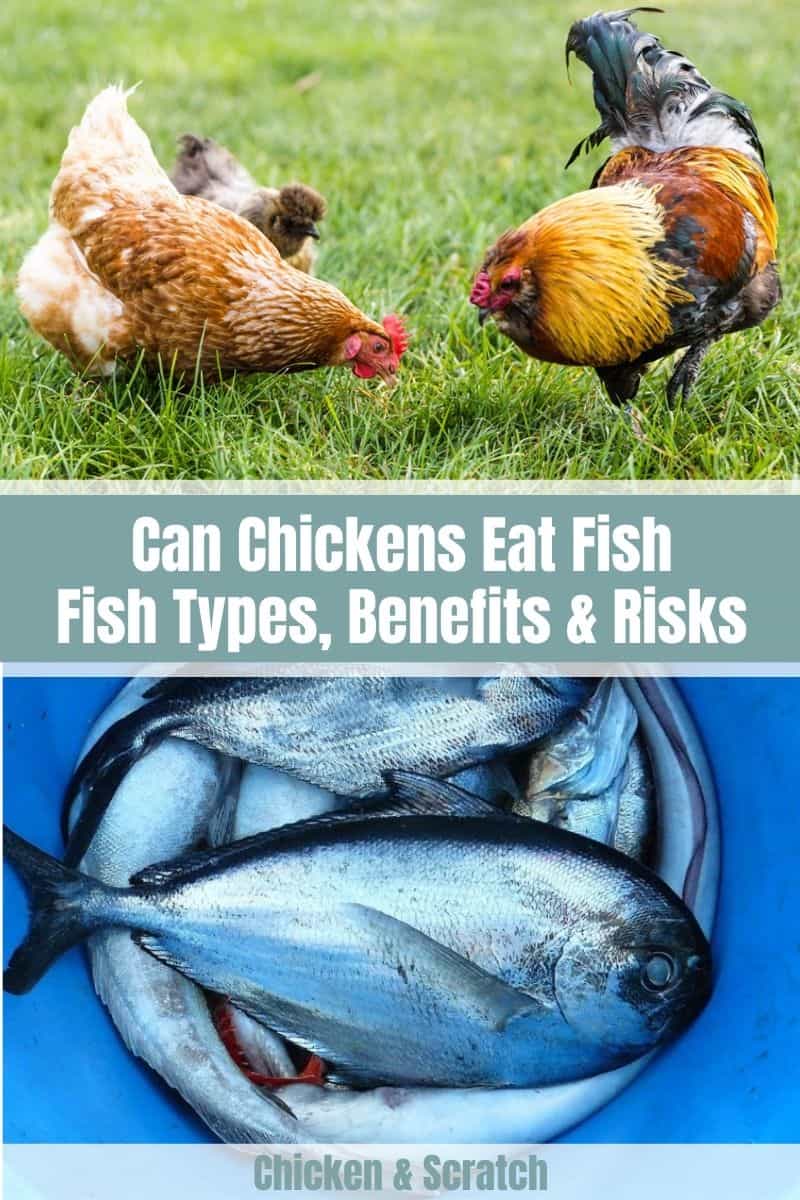

Joseph Hudson has been raising chickens for over 15 years. In 2018, he completed the Agriculture & Natural Resources program at Mt. San Antonio College. He currently raises over 1400 chickens on his 7.5-hectare farm. He keeps sharing his experience on raising healthy and happy chickens on Chicken Scratch The Foundry.







